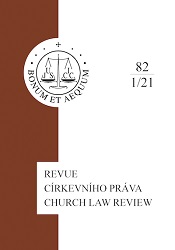Prípustnosť prísah podľa Graciánovho dekrétu
Admissibility of Oaths According to Decretum Gratiani
Author(s): Vojtěch VladárSubject(s): History of Law, Canon Law / Church Law
Published by: Společnost pro církevní právo
Keywords: canon law; oaths; Sacred Scripture; classical canon law; Decretum Gratiani; admissibility;
Summary/Abstract: Decretum Gratiani is the most important source of the history of canon law, as the contemporary form of this legal system is not imaginable without it. This work significantly influenced the development of several secular legal institutes, which took place in particular during the period of application of the first pan-European legal system ius commune. Oaths belonged to the most historically important procedural legal means, the contours of which were set to the smallest detail by the canon law scholars of the classical period, mediating their application to the modern times. In spite of the fact that they were on the one hand defined as individual type of ordeals, on the other hand they also played one of the most important tasks in the process of transformation from secular-law ordeals of the older type towards the standards of Roman-canon full proof, including the principle of free evaluation of proofs by the judge. Since the authorities of Sacred Scripture of the Old as well as the New Testament held mostly reserved positions on the oaths, Gracian’s most important task as the first classic was to specify the possibilities of their permitted use in detail. The main goal of the article is to point out the conceptual definition of the institute of the oath in Decretum Gratiani and define the accepted methods of its application in the classical canon law.
Journal: Revue církevního práva
- Issue Year: XXVII/2021
- Issue No: 82
- Page Range: 23-40
- Page Count: 18
- Language: Czech

